#segregation distorter
Text
When a simple organism sidesteps a complex law of nature
Early people will need to have puzzled why a lady or a boy was equally doubtless at delivery. Why did they seem in a 50:50 ratio and never, say, 67:33?
We know in the present day that the reply has two elements.
How is intercourse determined at conception?
One half is that women have two X chromosomes, one acquired from the mom and the opposite from the daddy, whereas boys have an X from the mom…
View On WordPress
#Ascomycota fungi#ascospores#fumonisin#Fusarium verticillioides#Mendelian transmission#Mendel’s laws#Neurospora crassa#non-Mendelian transmission#segregation distorter
0 notes
Text
How can a person make up for seven decades of misrepresentation and willful distortion in the time allotted to a sound bite? How can you explain that the Israeli occupation doesn’t have to resort to explosions—or even bullets and machine-guns—to kill? That occupation and apartheid structure and saturate the everyday life of every Palestinian? That the results are literally murderous even when no shots are fired? Cancer patients in Gaza are cut off from life-saving treatments. Babies whose mothers are denied passage by Israeli troops are born in the mud by the side of the road at Israeli military checkpoints. Between 2000 and 2004, at the peak of the Israeli roadblock-and-checkpoint regime in the West Bank (which has been reimposed with a vengeance), sixty-one Palestinian women gave birth this way; thirty-six of those babies died as a result.That never constituted news in the Western world. Those weren’t losses to be mourned. They were, at most, statistics.
What we are not allowed to say, as Palestinians speaking to the Western media, is that all life is equally valuable. That no event takes place in a vacuum. That history didn’t start on October 7, 2023, and if you place what’s happening in the wider historical context of colonialism and anticolonial resistance, what’s most remarkable is that anyone in 2023 should be still surprised that conditions of absolute violence, domination, suffocation, and control produce appalling violence in turn. During the Haitian revolution in the early 19th century, former slaves massacred white settler men, women, and children. During Nat Turner’s revolt in 1831, insurgent slaves massacred white men, women, and children. During the Indian uprising of 1857, Indian rebels massacred English men, women, and children. During the Mau Mau uprising of the 1950s, Kenyan rebels massacred settler men, women, and children. At Oran in 1962, Algerian revolutionaries massacred French men, women, and children. Why should anyone expect Palestinians—or anyone else—to be different? To point these things out is not to justify them; it is to understand them. Every single one of these massacres was the result of decades or centuries of colonial violence and oppression, a structure of violence Frantz Fanon explained decades ago in The Wretched of the Earth.
What we are not allowed to say, in other words, is that if you want the violence to stop, you must stop the conditions that produced it. You must stop the hideous system of racial segregation, dispossession, occupation, and apartheid that has disfigured and tormented Palestine since 1948, consequent upon the violent project to transform a land that has always been home to many cultures, faiths, and languages into a state with a monolithic identity that requires the marginalization or outright removal of anyone who doesn’t fit. And that while what’s happening in Gaza today is a consequence of decades of settler-colonial violence and must be placed in the broader history of that violence to be understood, it has taken us to places to which the entire history of colonialism has never taken us before.
1K notes
·
View notes
Text
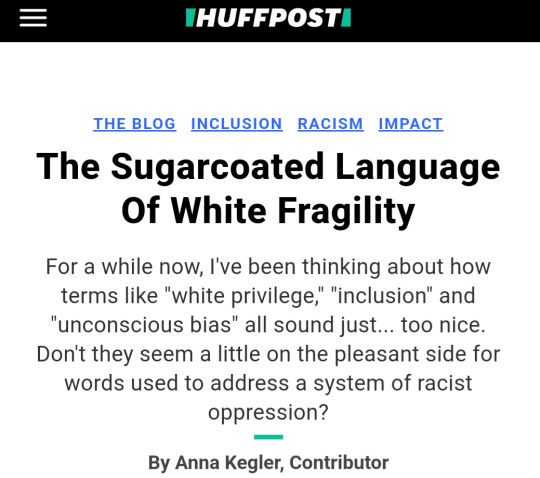
[...]The language we use to talk about racism is obviously distorted, a big clue that something is being hidden. It's pretty easy to pinpoint the source: most White people can't handle talking about racism. We flail. We don't understand the subject, we get really uncomfortable, and we either clam up because we don't want to say the wrong thing, or we bust out the whitesplaining (FYI, this is a best-case scenario. It can be much worse).
To mitigate our shortcomings, we surround ourselves with comforting words. Words that feel neutral. Words that don't point fingers (at us). Words that center Whiteness, while erasing the harshness of discrimination and segregation. We reject words that we feel are too direct, that might reveal complicity on our part.
[...]Dr. Robin DiAngelo, a White critical racial and social justice educator who created the term "White Fragility," breaks it down like this:
"White people in North America live in a social environment that protects and insulates them from race-based stress. This insulated environment of racial protection builds white expectations for racial comfort while at the same time lowering the ability to tolerate racial stress, leading to what I refer to as White Fragility."
White Fragility is a state in which even a minimum amount of racial stress becomes intolerable, triggering a range of defensive moves. These moves include the outward display of emotions such as anger, fear, and guilt, and behaviors such as argumentation, silence, and leaving the stress-inducing situation. These behaviors, in turn, function to reinstate white racial equilibrium."

We've had all the basic ideas we've needed to understand racism for a long time. The only reason to pay attention to the packaging is to observe that it's pointing to the real problem: the idea that we as White people are entitled to be lazy. We expect to be served knowledge about race and racism in palatable doses. We expect to rest in our fragility.
The solution: Put in work. We are not newborn babies or fancy teacups. We have the ability to actively seek knowledge and understanding.
As Vernā Meyers says, "not enough White people have done their work":
"After all the resources spent and goodwill extended, many white people, in exasperation, ask me why we haven't gotten further in racial understanding or increasing the diversity in our workplaces and lives. Sometimes, they don't like my response. I tell them what I have come to believe. Not enough white people have done their work: the work of seeing the barriers to true meritocracy, the work of putting themselves in the shoes of black people to learn more about their experiences and perceptions, the work of understanding how being white has shaped their worldview and self-perceptions, and the work of gaining the skills of deciphering and managing cross-racial and cultural dynamics. That's a lot of work, but without it you cannot create fundamental change in your sphere of influence."
source
The full article is worth the read.
850 notes
·
View notes
Text
We know through painful experience that freedom is never voluntarily given by the oppressor; it must be demanded by the oppressed. Frankly, I have yet to engage in a direct action campaign that was "well timed" in the view of those who have not suffered unduly from the disease of segregation. For years now I have heard the word "Wait!" It rings in the ear of every Negro with piercing familiarity. This "Wait" has almost always meant "Never." We must come to see, with one of our distinguished jurists, that "justice too long delayed is justice denied."
We have waited for more than 340 years for our constitutional and God given rights. The nations of Asia and Africa are moving with jetlike speed toward gaining political independence, but we still creep at horse and buggy pace toward gaining a cup of coffee at a lunch counter. Perhaps it is easy for those who have never felt the stinging darts of segregation to say, "Wait." But when you have seen vicious mobs lynch your mothers and fathers at will and drown your sisters and brothers at whim; when you have seen hate filled policemen curse, kick and even kill your black brothers and sisters; when you see the vast majority of your twenty million Negro brothers smothering in an airtight cage of poverty in the midst of an affluent society; when you suddenly find your tongue twisted and your speech stammering as you seek to explain to your six year old daughter why she can't go to the public amusement park that has just been advertised on television, and see tears welling up in her eyes when she is told that Funtown is closed to colored children, and see ominous clouds of inferiority beginning to form in her little mental sky, and see her beginning to distort her personality by developing an unconscious bitterness toward white people; when you have to concoct an answer for a five year old son who is asking: "Daddy, why do white people treat colored people so mean?"; when you take a cross county drive and find it necessary to sleep night after night in the uncomfortable corners of your automobile because no motel will accept you; when you are humiliated day in and day out by nagging signs reading "white" and "colored"; when your first name becomes "nigger," your middle name becomes "boy" (however old you are) and your last name becomes "John," and your wife and mother are never given the respected title "Mrs."; when you are harried by day and haunted by night by the fact that you are a Negro, living constantly at tiptoe stance, never quite knowing what to expect next, and are plagued with inner fears and outer resentments; when you are forever fighting a degenerating sense of "nobodiness"--then you will understand why we find it difficult to wait. There comes a time when the cup of endurance runs over, and men are no longer willing to be plunged into the abyss of despair. I hope, sirs, you can understand our legitimate and unavoidable impatience.
--Martin Luther King, Jr., Letter From a Birmingham Jail
24 notes
·
View notes
Text
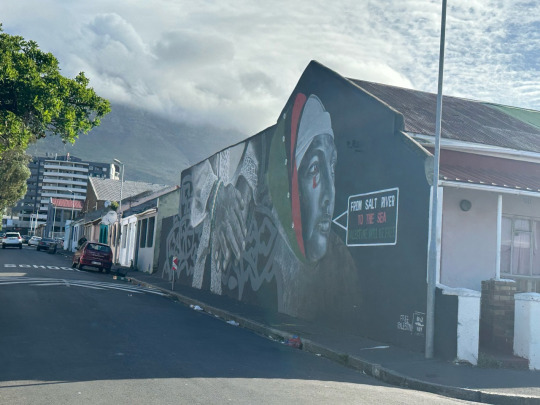
I took this photo in March of last year while in staying in Salt River, Cape Town. I ashamedly knew very little concerning the the 75 yr struggle that Palestineans had endured up until that time, and more importantly how its presence in Salt River revealed particularly sinister reminder of the global and interconnected struggle against neocolonial apartheid. Ahead of the ICJ hearing today, I began to reflect on my experience as a humble visitor of CT, a space that had resisted apartheid and persecution for 50 years at the hands of the same forces that are bombing Gaza at this very moment. I realized last year that my education up until that point was successful in conceslinv Salt River’s history of forced segregation, economic exploitation, and purposeful elimination of a community that was just one of many in SA. Apartheid isn’t just an abstract concept left to for historians to define or humanitarians to resolve. It’s a series of continued choices and policy changes brought down by our elected politicians all over the world as they work to maintain the demented and racist lie that one group of souls must enjoy the fruits of this earth at the violent expense of another.
Dehumanization campaigns on behalf of the state will never fail to do its job effectively, and us as a collective will continue to believe that these actions of violence are common and even necessary. These were the same campaigns that conceal/distort the history of my own ancestors as revolutionaries who were able to rise above the western imperialist project in 1804 as citizens of the first free black republic 🇭🇹🇭🇹🇭🇹 I’ve had to weep at the stories of my relatives and the conditions of my ancestors as they continue to pay the price for daring to escape from a sinister, systemic, and never-ending violence under the cruelest form of apartheid, chattel slavery. Resistance has and always willl be a continuing struggle against western hegemony and their hunger to reproduce the same value as the Transatlantic Slave Trade once did! We are fighting against the will of empires that view the labor, land, minerals of the global south as spoils of the game to win and not intrinsically tied to the indigenous that have/will continue to live there. Since columbus crossed into these shores and shifted the global order in favor of mass migrations and conquest, the world has never seen a turning tide in favor of restorative justice. We live in an age of globalized aparthied whether that therm is recognized or not by the state.
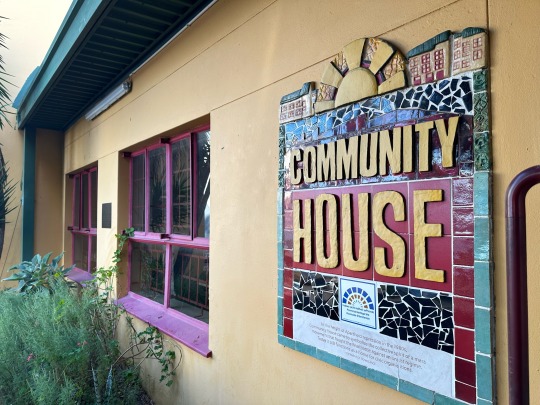
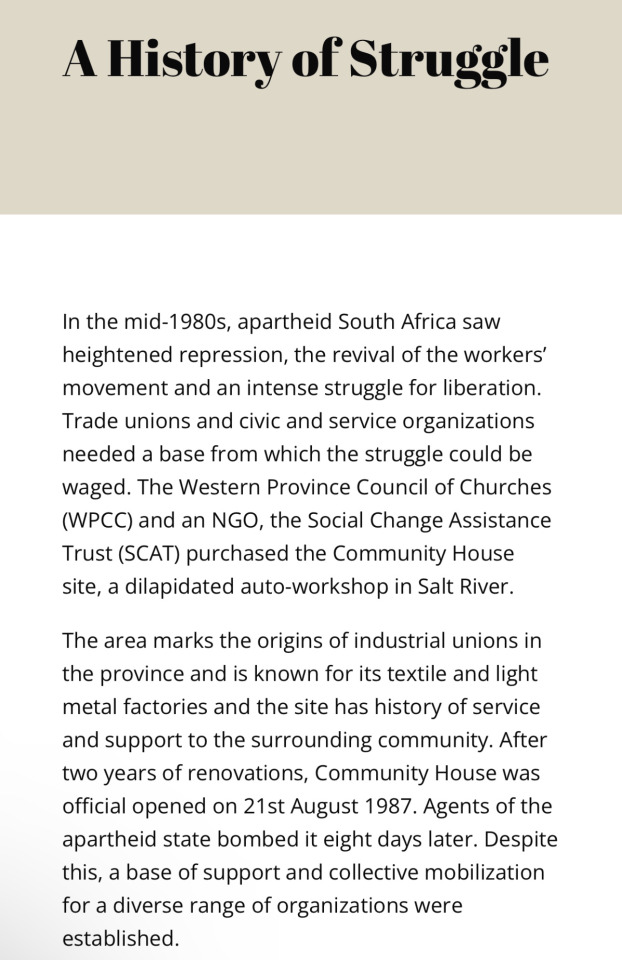
The place where I was set to study apartheid as it was EXPERIENCED, not as it was written after the fact, was itself a historical rembrandt of the Continuous Struggle. story having the familiar ending of spirits young and old gone in seconds by the “wrong” missle, or a “mistakenly”dropped bomb, or a “stray” bullet. Spirits so quickly taken away and never seen again in this realm. Imagine my shock when I passed the Statement of Significance (ZOOM IN) that welcomed visitors of the center. in CAPE TOWN SA, upholding its legacy as the literal first colonial outpost the slave trade for centuries! 30 YEARS AGO the imperial DA Party felt that the safety of the state could only be ensured though the dropping of a bomb here in 1987(Read Above). Despite this, I was able to enjoy a building that was standing tall and continued to be a center for education and community gathering despite this!
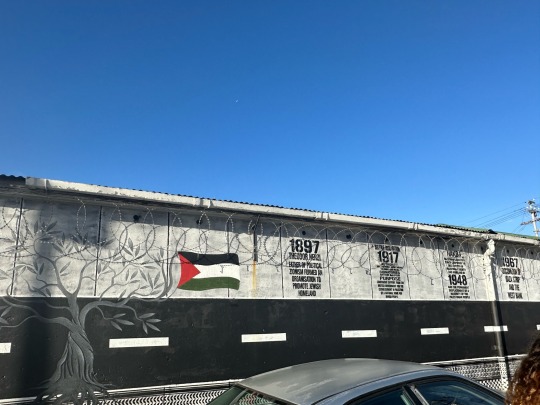

Crazily enough I was graciously given a tour of Salt River shortly after hearing the history of the SR Community Center and it’s activists, and was given incredible retelling of the street art located here. Not only fighting the hisotry of apartheid era violence, street artists of today’s time are struggling with state sanctioned gentrification efforts simultaneously eliminating the freedoms of expression and collective action calling for the end to Palestinean apartheid. Despite this, the level of Palestinean solidarity displayed so clearly across the homes of SR residents was incredible to witness despite hearing their bloody history of their oppression and continued resistance.
Bottom line, not only does the struggle persist, it is carelesslessly replicated and repackaged until it is acceptabe enough for us stomach on our TLs or news channels years after the fact. Genocides, ethnic cleansing, slavery, all exist and are being documented live! If you are so blissfully unaware…could you look back at your present self and take that as an excuse? if your children asked you where you were and asked what you stood for years from now, would you want to answer ‘I had no idea?’ You know what’s going on. you know that the carnage that has taken place is unconscionable!!! the people we elect, the state, whatever you want to call it at this point, has never atoned for their collective sins of the past few centuries. Not with actual fucking reparations, we’re far beyond expecting anything close to receiving back the value of systemic violence that was never contained. all that the opressed ask is to LEAVE US ALONE!!! it’s that simple. Stop sending your bombs! Stop sending your diplomats! Stop sending your twisted policies. This is only my second election cycle and I refuse to play these fucking mind games. Not that I belive voting really matters atp, but we must take back power where we can get it. I am of the opinion that this only comes from demanding MORE from OURSELVES than the people that end up on our voting ballots! How have you genuinely re-examined your position in this world and used the thinkers of today to challenge your position?
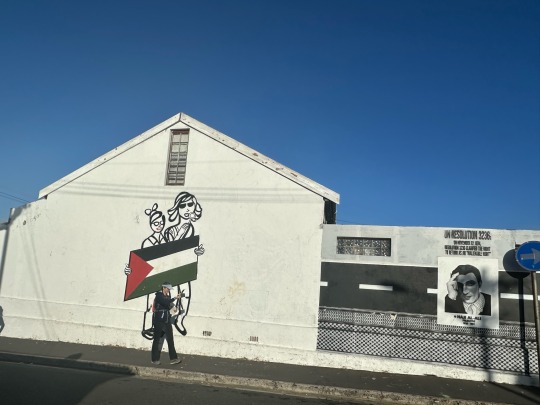
All I can ask of this world is for us to question where our collective allegiance rests. Are you fighting for or against western neocolonialism it’s quite literally that simple. the other side is clearly operating under delusion. this delusion…no this privilege…clearly knows no bounds! Our collective consciousness has long been shattered. From 🇭🇹 to 🇿🇦 to 🇵🇸 no land on this earth has been untouched by the dropping bombs and destroying community/culture in the name of successful western diplomacy. What can be changed is our individual alignment towards rge support of the oppressed, the dismantling of global apartheid, . Youtube/Google/Public Libraries are free belovedss 💔 If you have an iphone you can take a couple hours to hear the other side for maybe the first/only time in your life. play it in the background of whatever you need to do but even at 2x speed if you have to! challenging your own mind is the bare minimum…
youtube
youtube
youtube
youtube
youtube
youtube
youtube
youtube
youtube
youtube
17 notes
·
View notes
Text


—M. Jacqui Alexander, Pedagogies of Crossing, 2005
On Living the Privileges of Empire
I did not awake this morning to the deafening noise of sirens or the rocketing sound of nonstop bombs. I did not awake to the missiles that fall like rain from the sky, exploding on contact with land, staking out huge craters within the earth, collapsing people into buildings, trees into rubble, men into women, hands into feet, children into dust.' Two thousand tons of ammunition in three hours. Forty-two air raids in one day. Twenty-seven thousand air raids in a decade. I did not awake this morning to the taste of desolation, nor to the crusts of anger piled high from decades of neglect. I did not awake to the familiar smell of charred flesh, which sand storms use to announce the morning raid. I did not awaken in Basra to the familiar smell of hunger, or of grief for that matter, residual grief from the last twelve years that now has settled as a thick band of air everywhere. Breathing grief for a lifetime can be toxic. Breathing only grief simply kills. I did not awake in Falluja, symbol of the post-election settlement wager: votes in exchange for bombs. I awoke this morning from a comfortable bed, avoiding the interminable queues for rations of fuel or food, because I have the privilege to choose to live, unlike many who have lost their lives in the insatiable service of imperialism.
What do lives of privilege look like in the midst of war and the inevitable violence that accompanies the building of empire? We live the privilege of believing the official story that the state owns and can therefore dispense security, that war is over, that silence is a legitimate trade for consent in the dangerous rhetoric of wartime economy; the mistaken belief that we can be against the war yet continue to brand this earth with a set of ecological footprints so large and out of proportion with the rest of life on the planet that war is needed to underwrite our distorted needs; to consume an education that sanctions the academy's complicity in the exercise and normativization of State terror; to continue to believe in American democracy in the midst of an entanglement of state and corporate power that more resembles the practices of fascism than the practices of democracy; to believe that no matter how bad things are here they are worse elsewhere, so much so that undermining the promises of American democracy is an eminently more noble and therefore legitimate undertaking, more so than the undermining of democracy in any other place in the world; to assume that the machineries of enemy production pertain to an elsewhere, not operating within the geographic borders of the United States of North America. One of the habits of privilege is that it spawns superiority, beckoning its owners to don a veil of false protection so that they never see themselves, the devastation they wreak or their accountability to it. Privilege and superiority blunt the loss that issues from enforced alienation and segregations of different kinds.
#m jacqui alexander#m. jacqui alexander#pedagogies of crossing#imperialism#anti imperialism#transnational feminism#theory#ellis reads#she wrote this in 2005 but it is very very relevant right now
15 notes
·
View notes
Text
Love the ongoing argument "queer people can't support Palestine." Like, sure, you're saying the queer Palestinians who had to live their whole lives pretending to be what they're not, or having to live in denial of themselves, deserve to die because they were not born in a favourable place and time? And those who, maybe, dreamed of leaving so they could be themselves, they too? What about those queer people who had the fire to fight back and start a new chapter in their culture, do they have to die too?
Oh you didn't think that queer could exist in a place that forbids them? Clearly (and while you're at it, please revise queer history).
More often than not this comes from the mouth of a white person. Rich, isn't it, from a culture that has a history of denying queer people health care, of starting and maintaining slavery for centuries for economic purposes, of supporting segregation and apartheids, of distorting science for fascist purposes, of burning women, of exploring children labour, of exploiting poor people to death in factories and expelling communities from their homes to build a hygienist shopping mall on top. A culture with a history of doing everything wrong, but that never suffered the consequences for always being on the oppressor and power-holder side of humanity.
It's so easy to judge yourself morally superior when you think you've already gone by all the "civilised" steps and find yourself at the top. Bad news for you, M. White Moral: this kind of thinking, that anyone you judge inferior to you deserves to suffer, that's white colonialist mentality right there. Straight from the 16th century.
How is that morally superior?
13 notes
·
View notes
Text
RFK Jr. is taking the side of Confederate statue worshipers. He really doesn't like the removal of monuments to a treasonous and pro-slavery entity called the Confederate States of America.
Robert F. Kennedy Jr. denounced the removal of hundreds of Confederate statues and other monuments across the United States after the murder of George Floyd by a Minneapolis police officer in 2020.
In a podcast interview that aired live on Friday from the Libertarian National Convention in Washington, Mr. Kennedy, an independent candidate for president, portrayed the removal of statues honoring the Confederacy as “destroying history,” echoing similar comments made by former President Donald J. Trump in support of the monuments.
[ ... ]
Statues and other monuments glorifying the Confederacy were erected — most at the height of the Jim Crow era — as part of a movement to advance the Lost Cause myth, which in various iterations depicted the Confederacy’s rebellion as a noble defense of Southern values or falsely asserted that the Civil War was fought over “states’ rights,” not slavery. Many of the monuments also distort history by portraying Black Americans as loyal to white Southerners in their enslavement.
This puts RFK Jr. on the same side as Donald Trump.
Trump equated their removal to “changing history” when he defended some participants of a violent white supremacist rally in Charlottesville, Va., in 2017, who had gathered to protect the statue of Lee that was later removed. Mr. Trump later resisted efforts to rename nine southern Army bases that had been named for treasonous Confederate generals who fought against the U.S. Army.
President Biden has taken the opposite view, saying that such monuments have no place in 21st century America. Biden is the only candidate who stands against traitorous racists.
As a candidate in 2020, President Biden supported the removal of Confederate statues, as well as the renaming of the Army bases, which was ultimately carried out during his administration.
By coincidence, today (May 29th) is the birthday of the late President John F. Kennedy. JFK would be ashamed of his idiotic anti-vax, pro-Confederate nephew.
In 1963 President Kennedy federalized the Alabama National Guard to assist in the integration of the University of Alabama – the last segregated state university in the US. Alabama's segregationist Gov. George Wallace physically stood in the door to block two black students but gave way when confronted by the federalized National Guard.
youtube
That evening, on 11 June 1963, the president addressed the country on the topic of civil rights. Here is how historians now view the events surrounding that day.
youtube
Gov. Wallace went on to run as a third party candidate in the 1968 presidential election. Of course he didn't win but his presence in the election helped to elect Richard Nixon who gave the US the Watergate scandal and the invasion of Cambodia.
RFK Jr. is a lot more in the tradition of George Wallace than John F. Kennedy. Don't be fooled by RFK Jr.'s family name; most of his siblings and cousins have denounced him and declared their support for the Biden-Harris ticket in 2024.
#rfk jr.#glorifying the confederacy#defending traitors#confederate statues#jim crow era monuments#the lost cause#donald trump#very fine people#civil rights#university of alabama#segregation#george wallace#third parties#john f. kennedy#election 2024#vote blue no matter who
3 notes
·
View notes
Text
By: Winkfield Twyman, Jr.
Published: Nov 28, 2023
In a recent Equiano Project podcast featuring Helen Pluckrose, Helen talked about the perpetuation of racial essentialism and stereotype training. I feel comfortable referring to Helen by her first name in that I have known her since my days with Counterweight and given her early support for my book, Letters in Black and White: A New Correspondence on Race in America (co-authored with Jennifer Richmond).
Helen is the author of Cynical Theories: How Activist Scholarship Made Everything about Race, Gender, and Identity—and Why This Harms Everybody (co-authored with James Lindsey). Cynical Theories may well be the most prophetic book about the dangers of racial dogma in the past decade. Helen’s interview landed well with respect to the dark underbelly of Diversity, Equity and Inclusion (DEI) training.
The most important fire bell in the night shared by Helen is that people write things they do not believe. The ability to write and publish a book is a privilege, and a blessing. Less than 1 percent of Americans have published a book. As one user on Reddit calculates, the number of humans who have published a manuscript is far less than 1 percent. “Well, 6 million books on Amazon, which includes a big chunk of the self published authors, divided by 7 billion people and you get .0086%. So a lot less than 1%.”
Why does writing falsehoods pose a problem for society? When one writes a lie in print, one is reducing the sacred trust between a reader and a writer. Reality becomes distorted for the writer who must suppress the truth and for the reader who doesn’t recognise reality on the printed page. For example, someone might write that incarceration of black men is the new Jim Crow. That assertion is a falsehood. Jim Crow was a legally mandated system of laws to segregate blacks and whites in the public sphere. Incarceration occurs because someone commits a crime. Incarceration does not equal Jim Crow. But once the lie is seized upon in public discourse, people begin to live in lies and to not see the truth; i.e. criminals are incarcerated because criminals commit crimes.
I no longer believe anything authored by writer Michelle Alexander. She has abused her sacred opportunity as a privileged writer by bringing into the world a monumental falsehood, The New Jim Crow: Mass Incarceration in the Age of Colorblindness. We have all suffered and been injured by her distortion of truth and reality. But for Alexander’s fictional argument, the fertile groundwork might not have been present for the rise of another falsehood, Black Lives Matter. Sadly, one falsehood leads to another falsehood and so it goes.
It is the duty of a published writer to write the truth.
The next powerful insight from Helen was this idea that DEI training causes racial minorities to assess the level of racism as higher than it should be. Doesn’t this bad consequence ring true? Berry Gordy, the heroic founder of Motown in the year 1959, was once asked the reason for his success. Without hesitation, Gordy answered the reason was “focus.” This psychology applies to Gordy and, indeed, every ordinary human. If you focus on the positive, you will welcome the positive into your life. If you can only look at the negative, one invites the negative into one’s life. The divisive structure of DEI programs prompts participants to dredge up instances and examples of racism, no matter how remote or distant or of little consequence in one’s life.
If I were in a DEI program and the trainer asked me to name three examples of racism from my life when I felt oppressed, sure, I could search my memory banks and come up with three examples. Every black person could in the Western World. But having done so, the trainer has now implanted in my mind resentment and suspicion and ill-will towards my white colleagues. Such a poisonous outcome and for what purpose other than to raise race consciousness in the minds of work colleagues? It is a shame we enable these types of corrosive trainings.
Finally, Helen channelled the opinions of many black employees who have had enough! Around 60% of the people who reached out to Counterweight for help were black. They pleaded with Helen to stop the racialising at work. Black employees want normal relations with their colleagues, not perpetual grievance struggles about how oppressed one is and how evil oppressor white colleagues are. We should listen to these black employees who don’t like anti-racism programs, Professor Ibram X. Kendi, and all of the manipulative slogan words in the office nowadays.
Let people work together, lunch together and laugh together. DEI training should be discarded as an unworkable scheme that does more harm than good.
youtube
#Winkfield Twyman Jr#Helen Pluckrose#DEI training#diversity#diversity equity and inclusion#equity#inclusion#DEI bureaucracy#DIE bureaucracy#DIE training#racial division#tell the truth#truth matters#race consciousness#religion is a mental illness#Youtube
7 notes
·
View notes
Text
FYI to non Americans, I do think y’all should be aware of the way in which america purposely feeds you a distorted reality of what it’s like here. Most of us don’t live like the people on tv shows. The cities are often massively segregated, most people are struggling hard, and the only people depicted on our tv programs are usually from a select wealthy or at least middle class minority. I’ve seen a lot of immigrants buy into the American dream thing, but I cannot stress enough that this is propaganda. They do not show you the full picture of america; it’s less charming parts are completely erased from existence
10 notes
·
View notes
Note
hi there! ive always loved your history posts, and was wondering if you had any insights/directions you could point me in to learn more about a specific area of queer history?
im personally most well-read on the history of gay men in britain between the labouchere amendment and ww2, so a pretty specific area. i dont know very much at all about the history of queer women, though id think its harder to get primary sources for them as the legal records wouldnt exist in the same way?
anyway, my main question is actually about cross-gender solidarity. i notice that a lot of the men i read about operated in very gender segregated spaces, which was typical for the era anyway and ofc there are plenty of spaces today where gay men want to be with other gay men exclusively. i suppose im wondering if there's any way of investigating how much queer men in the past would have felt solidarity with queer women, and how to look at whether/how those sentiments changed over time?
i realise this is a bit more of a "how to do history" question than about history proper - any insight or thoughts you'd like to share about this would also be really appreciated! and in either case, hope you're having a great week xx
First, thanks! Glad to help.
Second, the difficulty of doing premodern queer history largely or exclusively from legal documents is that a) it gives us a distorted version of what degree of prejudice actually existed in society, on a practical and not just theoretical level, and b) it makes it even more difficult (if not impossible) to speculate on what people "really" felt, thought, or personally identified. (I currently have a book chapter about John/Eleanor Rykener in the peer-review process, which touches on some of this difficulty, since our only major source in that case is also a legal record.) We are very rarely granted direct access to the actual voices or perspectives of premodern queer people, and if it's filtered through a hostile framework that has an interest in minimizing that person's existence and/or social experience, it provides an even more excessively or solely negative picture than is probably at all the case.
However, I would gently challenge your idea that it's harder to get primary sources on queer women, since the assumption is that premodern queer men are only memorialized by their (presumably punitive) encounters with the legal system, and that society cared less about female homosexuality and thus did not attempt to police it in the same way. Both ideas have some degree of truth, but not entirely and certainly not categorically, and there are many ways to access premodern queer experience and memorialization. I don't know what particular time/region you're interested in, but since you said Britain, I will once more recommend checking out the website of gay British historian Rictor Norton. He has everything, and I mean everything, you could possibly want as a resource/starting point (his specialty is 18th-20th century British LGBT history):
He has a wildly extensive list of links to subject, region, and chronological-specific LGBT history:
He has an equally comprehensive list of links sorted by region, methodology, art/music history, thematic approaches, etc:
Now, obviously I haven't combed through all of these to see if there is something that specifically addresses the question of premodern mlm/wlw solidarity, but since queer spaces have often been a lot more gender-mixed than people tend to think, there are certainly more than enough resources to get you clicking and searching.
42 notes
·
View notes
Note
Was Maria Reynolds part of the plan to " blackmail " Alexander ? Thank you.
Not initially, I don't think. The painful truth is, of course, we'll never know for certain. Especially in regards to the Reynolds affair, with all of the theories surrounding it and no one knowing what's true or not due to Maria's missing letters, and her own pamphlet being lost to time. [x] So, all we have for solid proof is a bias pamphlet from Hamilton, and slandering newspaper extracts. The Reynolds Pamphlet was naturally a one-sided account, and written five years after the affair. Hamilton paints himself as the victim of James Reynold's and Maria's “con couple plot” to blackmail him. And many historians ultimately side with this notion that fits the narrative of the manipulation by a calculated and pretty woman, with her wealthy man prey. But it is my belief that Maria had initially wanted for it to be a traditional mistress situation with Hamilton, that was subsequently distorted into a form of Reynolds's blackmail.
Maria was a lower-class woman, who was seeking happiness and fulfillment through sexual acts, in order to feel loved and cared for. This was actually a common case for many women at the time;
There was another group of women who exercised sexual independence within post-Revolutionary Philadelphia—those who engaged in sex commerce. In many ways, their economic an sexual independence was the most obvious manifestation of female autonomy. Prostitution enjoyed an enhanced position within the community because the world of nonmarital sexual behavior had expanded. Amid the permissive sexual culture of the city, the behavior of those who engaged in sex commerce was less distinct. Women who engaged in sex commerce were more public than in the late colonial era but also more integrated into the broader sexual culture. Evidence from Philadelphia suggests that during the transition between the sexual system of the late colonial period and that of the nineteenth century, prostitution took on its most fluid and least exploitative form.
Philadelphia could not have been more different. Sex commerce prospered during the 1790s as part of the expansive, permissive sexual culture and was well integrated into the public and semipublic leisure world of the city. It was neither geographically segregated nor isolated from the urban centers. Bawdy houses occupied all regions of the city. There were bawdyhouses on the city's main streets and more modest establishments among its alleys. Sex commerce also took place in the backrooms of taverns, in the prison, and in the theater and often spilled into the streets. Women solicited men in the streets, mixing with the legitimate evening strollers, meeting men, and then retiring to rented rooms or bawdyhouses. Sometime they even engaged in sexual transactions in the city's alleys and abandoned lots. Much of this activity took place within the public view. Women called to men from their doorways soliciting their business, and other strolled about the street in pairs to meet men. Prostitutes were known on sight when they were seen shopping, socializing about the town, or entering the almshouse. The identities of their clients were also often common knowledge—many men were not concerned about secreting their behavior. Some demonstrated a striking disregard for being seen. One “well known gentleman,” Moreau de Saint-Méry tells us, “leaves his horse tied to the post outside one of these houses, so that everyone knows when he is there and exactly how long he stays.”
[...]
Sex commerce of the early national period was part of a continuum of illicit sex, and it was not always easy to distinguish which encounters crossed its fluid boundaries. Prostitution operated in many of the same social spaces as other forms of nonmarital sex, integrated into these worlds of socializing and public amusement. Women brought men to the same disorderly houses for prostitution that couples frequented for illicit sex.
[...]
People from all walks of life had sexual encounters that were not markedly different from those of prostitutes and their clients. The woman who supplemented her income by periodically strolling the streets to meet a man who would pay for a sexual encounter had much in common with the woman who frequented taverns accepting food and drink from a gentleman with whom she later had sexual relations. Gifts of goods, food, or drink were part of the sexual exchange in many relationships. Prostitutes who worked the theater expected the gentlemen in the boxes to treat them to the wines and liquors served during performances. This custom was not that different from the gift giving that accompanied adulterous liaisons, where lovers presented gifts and sometimes cash to their partners. Like the women of the town, women who engaged in adultery were treated to gifts by their lovers.
Source — Sex Among the Rabble: An Intimate History of Gender and Power in the Age of Revolution, Philadelphia, 1730-1830, by Clare A. Lyons · 2012
If Reynolds was away, or out of town, Maria took lovers. Folwell even says; “Letters were frequently found in the Entry inviting her Abroad;—and that at Night she would fly off, as was supposed to answer their Contents.” [x] with her husband constantly off, Maria supplemented her unhappy way of living by becoming sexually involved with other men and accepting “gifts” such as money. And it is likely that James Reynolds rather utilized this to his gain when discovering her affairs, and twisted it into instead pimping of his wife for prostitution.
It is also reasonable to assess that Maria was likely looking to become Hamilton's mistress - and mistress, only - because of the state she was in. Maria was recorded to have said plenty of times that she was being mistreated by her husband. Hamilton says that Maria told him; “that her husband, who for a long time had treated her very cruelly, had lately left her, to live with another woman, and in so destitute a condition, that though desirous of returning to her friends she had not the means—that knowing I was a citizen of New-York, she had taken the liberty to apply to my humanity for assistance.” [x] Folwell sides with this distressing description claiming;
Her mind at this time was far from being tranquil or consistent, for almost at the same minute that she would declare her respect for her husband, cry and feel distressed, [the tears] would vanish and levity would succeed, with bitter execrations on her husband. This inconsistency and folly was ascribed to a troubled, but innocent and harmless mind. In one or other of these parox-ysms, she told me, so infamous was the perfidy of Reynolds, that he had frequently enjoined and insisted that she should insinuate herself on certain high and inf l uential characters—endeavor to make assignations with them and actually prostitute herself to gull money from them.
Source — Alexander Hamilton, by Ron Chernow, page 366
A secondary source also claims Reynolds to have been abusive towards his “children”. [x] So, it is possible in this case that Maria was suffering from Reynolds's abuse, alone in Philadelphia, and isolated from her friends and family in New York. And during the times where cruel acts like physical and verbal abuse towards your wife were normalized to a certain extent—that no one would really intervene unless it started to violate another's subjective barrier of morals or condemnation. Or in many cases, if it was deducted that the woman in question was blameless and undeserving (But this is a misogynistic society we are talking about, so how likely of a case is that in general?). So, overall I wouldn't deem Reynolds above abuse towards his wife, or that Maria was merely playing an act for sympathy, there was probably some truth there. With all that in mind, it really seems like Maria engaged in sexual acts with others, or “prostituted” herself, in a way to look for a better love life. And that she may have truly been hoping for a better life with Hamilton. She was likely aiming to be kept as his mistress, but did not succeed in the end due to her husband's involvement. As I said, it was typical for a time when sexual autonomy and economic sufficiency were often intertwined. And Hamilton clearly wasn't entirely against this idea, or that he wouldn't have an adulterous lover for a night—He was 34 at the time, and perfectly capable of making conscious decisions. He was ready to give the money and do the deed. Although, I would argue he wouldn't be too keen on anything much more than a night, or the summer until his family returned, since he rather embarrassedly throws cash at Reynolds to cover his tracks rather than be calculated about it (He seems to have had something against affairs, as they were just against his moral and marriage values which I have gone into before). But also this was exceedingly common for men of all classes at that time, and he was in no way out line in this regard. He knew people who did the same like Governor Morris, so it isn't like this idea was new to him. And it was only when Reynolds started blackmailing him, and that it threatened his marriage and his political career, did he suddenly back down.
There can be much speculation if Maria truly hoped Hamilton would be the one sliver of light in her dark world, and if she truly cared for him, or if she truly felt loved in his presence. Nonetheless, if any of these sentimental feelings did exist, they definitely didn't survive the release of the pamphlet. And I can only assume how crushing it must have been for Maria who suffered the most in the aftermath. She did sign her letters off to him as “Mari”, which could also imply much—Did he call her Mari? Did she call herself that to reel him with guilt and fake intimacy? Which is another consideration, if Maria even cared for Hamilton or his well-being, but rather envisioned him as nothing but profit.
It also shouldn't be completely dismissed that Maria may have been in on the whole scheme. After all, it is suspiciously convenient that James moved his family from New York to Philadelphia, and in the neighborhood possibly in - but definitely not long before - 1791. It is speculated due to Reynolds's tendency toward intrigue and money troubles that the move was made for financial reasons, but it is curious that the affair took place not too soon after. And as mentioned before about Maria seeing several different men, I doubt Hamilton was the only man they plotted against, if they were indeed a con couple. It isn't confirmed that Maria wasn't in on the whole ordeal, or that she wouldn't have agreed to the form of financial gain. I think the only opposition here would be that Reynolds and Maria were separated at the time of the start of the affair, and all that I said before.
Moving on, Maria's divorce from James doesn't come as a surprise. Women - especially the lower class ones - got divorced all the time. While plenty of abuse was tolerated, and even expected to be tolerated, being prostituted by your own husband definitely hit the line. And it was likely Maria's indication of finally breaking away from what she so desperately had been trying to previously. For Maria it was possible for her to go on to marry up the social ladder, to become a respectable woman. And eventually she did, changing her name, and settling down with another man. Without much insight on what was truly her goal—The easiest conclusion I can deduct is that Maria - like many women of her class - was left in a poor marriage from a young age, and used emotional and sexual fulfillment, along with economic stability, because that was all she had at the time. And through her own efforts and in spite of hardship, eventually achieved her goal.
But, in the case that they were a couple of con artists and Maria was not looking for men for comfort, and was truly not being abused; then the divorce was likely because the scheme ended in failure, and still it would make sense that Maria would leave him.
Basically, in my own opinion, I don't think Maria was in-on the scheme at first, I think she was looking for wealthy men to douse her in tender affection and money to make the best out of what she had. But due to her husband exploiting the situation, she was entangled in a blackmailing affair that tarnished her name later on. But with the possibility of this being wrong, it could have also likely been a scheme considering how smoothly things played out for the Reynolds' in the beginning.
Hope this helps!
#tw: domestic abuse#tw: abuse#I got so off topic in random sections of this but there was too much to dissect and include#amrev#american history#reynolds affair#alexander hamilton#historical alexander hamilton#james reynolds#maria reynolds#history#queries#sincerely anonymous#cicero's history lessons
25 notes
·
View notes
Text
I'm so tired of addressing the same arguments from people who believe in the Hypodermic Needle Theory. Well, here we go again...
Gonna try to keep this post short.

• "Uncritically consuming content"
Media audiences aren't passive absorbers of messages, even when they watch a movie casually and don't go write a meta post about it on Tumblr or Reddit.
• "Your brain state"
• Subliminal messaging
You're the one who hasn't heard of subliminal messaging, buddy:
"They can't make you go buy something you don't want or vote for a political candidate you don't like," Zimmerman said. "The messages just aren't that powerful."
• Propaganda
• The Birth of a Nation — This is on par with Jaws being used as a "gotcha," but much more annoying.
“People were primed for the message. Hard to argue this was a distortion of history when the history books at that time said the same.” — Paul McEwan, film studies professor at Muhlenberg College
The film was made during a time when Jim Crow laws — based on white supremacy ideology, which had existed long before the film's creation — still enforced segregation in the United States.
The film reached people who were already racists, and would've continued holding those anti-black beliefs, with or without The Birth of a Nation.
I'd go as far to say that the civil rights movement alone would've probably pissed racists off into reviving the KKK — if the film hadn't inspired William Joseph Simmons.
Ergo, The Birth of a Nation itself did not turn people into racists. They were already that way due to the time period they were living in:
And their education:
youtube
#fiction analysis#media analysis#media audiences aren't passive recipients#fiction is not reality#the birth of a nation#my posts
29 notes
·
View notes
Photo








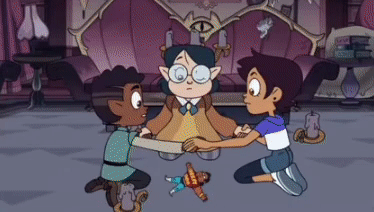

Miltown Numerology and the Study of Spatial Distribution (Top Image: DHMIS)
111 (Scene 1 - MFKZ) : Emotional interconnectivity felt between living beings through vibrations in the heart, body and shared perception: We are all children of the sun, moon, stars and the planet from which we were born and we were given senses to harmonize and make the world better. We were not only given eyes but hearts, and gravity affects everyone on the planet which allows us to have a gut instinct due to our hearts being vibrationally effected by gravity. This is why the moon’s tides on the ocean has an effect on the water in our bodies because we are 60-70% water.
3/33/333 (Scene 2 - Omi, Xiaolin Showdown): Light and Dark aren’t to be confused with good and evil; It is very obvious that even when distorting the colors of Omi when he enters the Yin Yang realm causing him to be a black shadowy figure he still is exactly the same character. The Yin Yang is a symbol derived from the ancient texts of the Tao Te Ching which helps people unlearn what they were taught by others so that they may find truth based off of their own first-hand experience. It is no secret that our education system lies, as we have seen this first-hand with the teachings of Christopher Columbus and other attacks on people of color. The English language is written in a way to make “good and evil” and “light and dark” synonymous in order to confuse and segregate our culture. Just because two concepts can be identified to be opposites, does not mean that the world is binary. Up and down is not the same as forward and back.
39/139/309 (Scene 3 - Boondocks): Your karma matters and what you do in this life will affect what happens to you later. Not just in this life, but in the next one. You’re not just a ping ball in a machine that’s being bounced around for the entertainment of the universe. Everything you do matters, and even though the public consensus seems to be that nothing matters, eventually everything comes full-circle and you get to be the protagonist of your own life and be the coolest person you’ve ever met. If you get deja vu while reading this, great! Heed my instructions and become everything you’ve always wanted to be.
23/2030 (Scene 4 - Rise of TMNT): Balancing the different areas of your life in order to make your aura the energy signature that you want all starts with your diet and what you pay attention to daily. What are you consuming on social media? Television? Who do you spend time with and what information are you feeding yourself? Pay attention to what habits you have that lead to any anxieties or other troubles you may going through mentally. Make sure you’re feeding your body fruits and vegetables so that the healthy cells in your food can regenerate throughout your body. Make sure that what you do on a daily basis is what you actually enjoy doing and you’re not just working off of auto-pilot. Make sure that the decisions that you make lead to the results and the reality that you want.
707 (Scene 5 - Dojo, Xiaolin Showdown): A lot of people assume that the medium of animation isn’t for adults and only for children. Art, and animation as a whole is overlooked when in reality it helps evolve consciousness. Not only is animation great for storytelling, but it also helps to convey expressiveness of concepts in a tangible way that is typically only short-lived in the realm of dreams. Art and animation helps expand upon the world of dreams by analyzing these concepts and building upon them. Here we have a dragon flying through a jungle and using magical abilities, pushing the boundaries of what seems unlikely in our reality but is normalized in this space.
56 (Scene 6 - Sonic Adventure 2: Battle): Certain people like to push the narrative that men and women to be polar opposites with completely different purposes in life by pointing to the differences in body structure and religion to be the main evidence for why this is the case. Games like Sonic Adventure 2: Battle have you play as a variety of different characters that all look different in the main single-player story mode and pushes gender boundaries by having you play as both men and women in order to complete the game. Instead of being seen as a sexual character, Rouge the bat is- well, just as normal as everyone else. Her and Knuckles have near-identical gameplay styles and functionality and can be played against each other in versus mode. Rouge in the game pushes the idea that guys can play as a girl character, and girls can play as a guy. It’s inclusion, rather than separation. This goes for anybody really, everyone at their core is just someone that wants to have fun and be loved and acknowledged and included, just like everyone else.
14/1414 (Scene 7 - Teen Titans): You probably know that despite what they teach us in school, our entire experience with life is not just the result of some chemical in the body manufactured to create your every waking moment. The public school system likes to make it seem like we’re robots that miraculously came into existence but if you’ve gazed into the light you know that everything is more than coincidence. Notice the time clock in this scene. Starfire jumping into the past caused the entire timeline to shift leaving the titans to go twenty years in her absence before undoing it while fighting the time thief.
And finally 254 (Scene 8 - The Owl House): The study of patterns alluding to a shadow of the world beyond human perception. There are a lot of trends nowadays that like to lock people in a mental prison and throw away the key by telling them that they’re the only person that exists and that this is just a virtual reality simulation or a dream. Pay attention to anything that surprises you, and pay attention to patterns that go unchecked or unnoticed by your typical conscious algorithm and see how the world is so much bigger than people make it out to be. The world isn’t small, and neither are you. You matter, and your life matters.
Alright that’s it that’s all I’ve got thanks for reading. Also if you’re new to Tumblr and/or migrating from Twitter, welcome. (Bottom image: Proud Family)
#dhmis#mfkz#xiaolin showdown#the owl house#sonic adventure 2#cartoon network#gamecube#dreamcast#mutafukaz#proud family#sa2#toh#teen titans#sonic#teentitans#yellow guy#333#twitter#tumblr#proudfamily#rottmnt#rise of the tmnt#boondocks#the boondocks#sa2b
43 notes
·
View notes
Text
The Influence of Stereotypes on Children's Development
By Maria Fernanda Malzoni
At what stage of life do stereotypes begin to immerse themselves in people's daily lives? Society grapples with the widespread dissemination of distortion and exaggeration of data among various groups and individuals, resulting in the propagation of generalized and misleading impressions that culminate in the notorious phenomenon of stereotypes. From an early age, children are not only inundated by a multitude of external information but also from diverse internal and daily routine sources, encompassing family, media, and educational institutions. This constructs a robust cornerstone for the early cultivation of stereotypes, propelling them to segregate, ostracize each other, and render judgments based solely on superficial appearances. These deeply entrenched societal divisions act as significant impediments to the establishment of meaningful social connections. In accordance with this, stereotypes are ingrained in society since social interactions in childhood.
Therefore, stereotypes possess a subtle yet potent sway over children, exemplified in the cartoons and films they consume. Disney movies, captivating approximately 17 million viewers annually, frequently perpetuate ingrained norms. For instance, "The Little Mermaid" portrays the princess's transformation to fit the ideal partner's mold. "Dumbo" subtly alludes to historical injustices with black circus laborers juxtaposed against a white owner. Furthermore, many films accentuate the relentless pursuit of romantic partners and perpetuate unrealistic beauty ideals, as seen in characters like "Sleeping Beauty," "Cinderella," and "Jasmine." These depictions can firmly implant notions in the impressionable minds of children.
The toy industry consistently mirrors prevailing societal standards, as exemplified by iconic brands such as Barbie, Polly, and Lego. Notably, black dolls represent a mere 6% of the children's toy market, with only 14 out of 22 major brands offering options for black dolls, which experience sales approximately 20% lower compared to their white counterparts. This glaring disparity is underscored by the fact that the first black Barbie was introduced as recently as 2018, while the white version has been a staple since 1959. As a result, these
statistics shed light on the ongoing struggles in achieving equitable representation within the toy industry.
Moreover, the widespread presence of children on social media constitutes a significant and noteworthy phenomenon, with over 86% of children under the age of 12 having access to these digital platforms. Within this context, it becomes imperative to recognize the substantial presence of children, who constitute 39% of TikTok's audience, frequently exposed to specific marketing campaigns, notably one associated with a cleaning company. This engagement with social media is often characterized by a profound reliance on visual effects, filters, and occasionally, the propagation of stereotypical comments, thereby further accentuating the prevailing beauty standards as a coveted facet of online interactions. This evolving trend underscores the ever-changing landscape of social media and its far-reaching implications for its younger users.
Although our world is increasingly interconnected, the presence of stereotypes from early childhood is of significant concern. These stereotypes not only influence children's perceptions and attitudes but also shape their interactions with the world. Children, whose understanding of life is still developing, absorb information from various sources, such as movies, toys, and social media, which become the building blocks for their future perspectives. Unfortunately, many of these sources perpetuate, beyond everything, distorted and prejudiced views about individuals and groups, constantly promoting inadvertent discrimination.
(538 words)
2 notes
·
View notes
Quote
This fantasy of Black Americans somehow being a privileged class is hallucinatory — and hilarious, at least to Black folks I know. But it is consequential, too, because it is one of the imagined wrongs that animate the MAGA political movement. There is a direct line between Adams’s rant and the MAGA effort to sanitize and distort the teaching of Black American history, because it is impossible to believe Black people are “the winning team” and at the same time acknowledge the centuries-old fact pattern of slavery, Jim Crow segregation and systemic racism.
Scott Adams spouted racism. Dropping 'Dilbert' is free speech at work.
8 notes
·
View notes